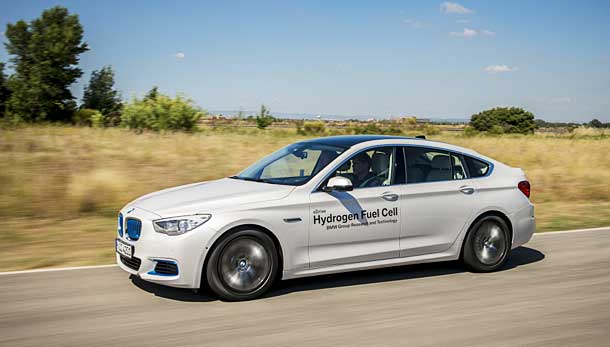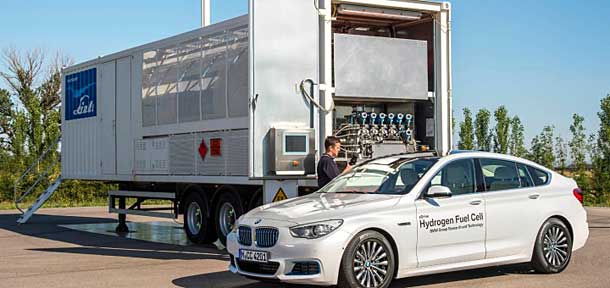
Created from the 5 Series Gran Turismo with the system co-developed by Toyota, the BMW Series 5 GT Hydrogen car promises to deliver excellent performance with zero emissions. The new 5 GT Series also sports an added advantage over pure plug-in electrical vehicles as it does not have the lengthy recharging times.
The newest FCV prototype from BMW does offer an electric motor that comes from the sub-brand known as the “I”. The motor offers a considerable 180kW / 245 hp which makes it comparable to the 2.0L, turbocharged four cylinder gas engines from their latest models, but all without the emissions. Instead, this vehicle runs on hydrogen which is held in a compressed tank located between the axles. This new storage system allows the vehicle to run up to 300 miles before refueling.
The BMW – Toyota connection started in 2013 when both companies began working towards the goal of a practical hydrogen powered vehicle. The initial goal was to have the approved components ready by the year 2020 and sales beginning shortly afterward. In the meantime, both companies have started to release hydrogen powered vehicles such as the Mirai from Toyota.

BMW History with Hydrogen
For the past three decades, BMW has been researching the possibilities with using hydrogen as a fuel source. In 2006, the BMW Hydrogen 7, the first luxury sedan that was powered by hydrogen and gasoline (dual fuel) was unveiled. The BMW Hydrogen 7 used a customized internal combustion engine plus super-insulated liquid hydrogen tank to provide clean power. With the flip of a switch, the vehicle could seamlessly run on gasoline, so range anxiety was not an issue with this vehicle.
Since the unveiling of the Hydrogen 7, BMW has worked tirelessly to create a better, more efficient system using hydrogen as a power source.
In 2013, BMW started collaborating with Toyota who had also been working on the same type of system and the result is that both companies have developed new hydrogen powered vehicles. The hope is that by the turn of the next decade hydrogen powered vehicles will be an everyday part of the automotive scene and begin to replace conventional gasoline and diesel powered motors.

Hydrogen Fuel Cell Technology
The hydrogen fuel cell vehicle (FCEV) has been in development for well over a decade with BMW leading the way in this zero emission field. The new BMW eDrive technology built around the FCEV offers a number of attributes that separate these vehicles from standard plug-in electric versions.
- eDrive electric motor provides instant power delivery
- All-electric engine
- Emission-free driving
- 300 miles between refueling
- Refueling in under 5 minutes
- Uses high-voltage battery, power electronics and intelligent energy management
Essentially, the system converts the gaseous hydrogen that is located in a pressurized storage tank and turns it into electrical power for the vehicle with the rest being expelled as harmless water vapor. The result is that the battery that helps runs the vehicle is far smaller than what is found in standard plug-in electrical cars. The hydrogen is stored in a cool gaseous form and can be filled up in roughly the same time as a standard gas or diesel tank.